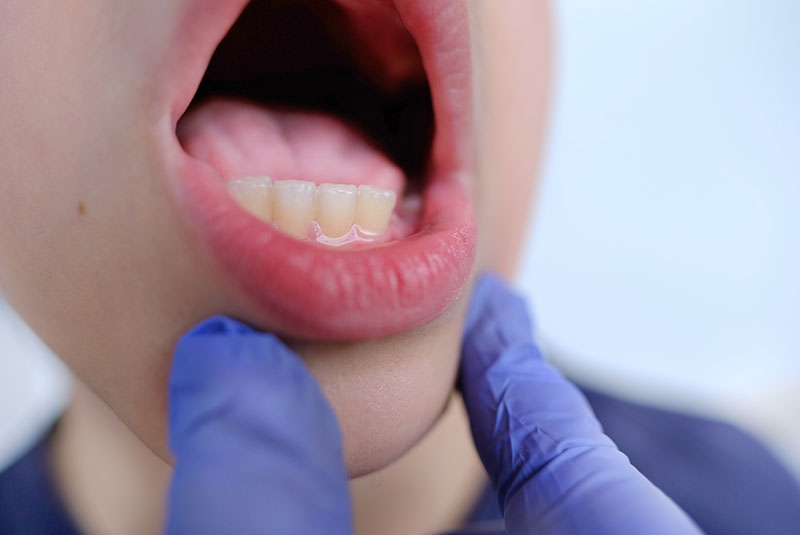
Tongue and lip tie are common conditions affecting infants and children. Tongue tie, medically known as ankyloglossia, occurs when the thin band of tissue (lingual frenulum) connecting the tongue to the floor of the mouth is too tight or restricts the tongue’s movement. This can lead to difficulties in breastfeeding, speech articulation, and oral hygiene.
Lip tie, or labial frenulum tie, refers to a similar condition where the tissue connecting the upper lip to the gum line is unusually tight, potentially impacting breastfeeding and dental development. To improve functional and developmental outcomes, both tongue and lip ties can be assessed and treated by healthcare professionals, such as pediatricians or dentists.


Max Dental Group specializes in comprehensive solutions for tongue and lip ties, including expert frenectomy procedures. Our experienced doctors skillfully address restrictive frenulum tissue, whether affecting tongue movement or causing lip tie issues, resulting in improved oral function, health, and self-confidence for our patients.
With outpatient-based frenectomies, our approach ensures rapid recovery times. Our expertise also extends to concerns like low frenum attachment leading to a diastema, where we employ procedures like frenectomies to enhance oral aesthetics and functionality, leaving our patients with healthier, more confident smiles.
Correcting tongue-tie in infants is significant in the early stages of their development. However, it’s important to note that not all lip and tongue tie cases require intervention. Correcting lip and tongue tie is typically based on the severity of symptoms and the impact on the child’s overall well-being. If severe cases are left untreated, they can cause some of the following issues:
Lip and tongue-tie can interfere with successful breastfeeding. Infants with tongue-tie may have difficulty latching onto the breast, maintaining a proper seal, and extracting milk efficiently. This can lead to inadequate nutrition, poor weight gain, and frustration for both the baby and the mother. By correcting tongue-tie, breastfeeding can become more comfortable and practical.
Tongue-tie and lip-tie can affect the development of speech and articulation. The limited range of tongue movement may lead to difficulties in pronouncing certain sounds, such as “l,” “r,” “s,” and “th.” Correcting tongue ties early can improve the chances of normal speech development and prevent potential speech impediments later in life.
Lip and tongue-tie can hinder proper oral hygiene practices. The restricted movement of the tongue may make it challenging to clean the surfaces of the teeth and gums effectively. This can increase the risk of dental decay, gum disease, and other oral health issues. Correcting tongue-tie with a frenectomy allows for better oral hygiene maintenance, promoting good dental health from an early age.
Apart from breastfeeding challenges, lip, and tongue tie can also affect bottle-feeding and the introduction of solid foods. Infants may have difficulty manipulating the nipple or sucking from a bottle, leading to feeding difficulties and potential aversions to certain textures. Correcting tongue-tie can improve feeding abilities, allowing for a more varied and balanced diet as the child grows.
I understand the information disclosed in this form may be subject to re-disclosure and may no longer be protected by HIPAA privacy regulations and the HITECH Act.
